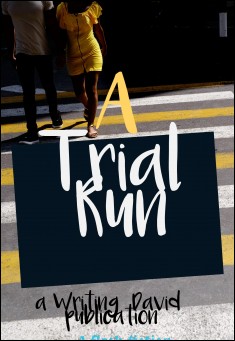A Trial Run is a realistic fiction; a combination of three unique stories seamlessly weaved together in an afro-centric theme. The book is written in three parts, with each part written in a peculiar style with a different story in each. However, the three stories come together to paint one picture; which circulates in the experiences of an average young Nigerian. As a work dynamic in style, yet precise in purpose, a trial run seeks to highlight in its different parts a plain field for thoughts, especially for every Nigerian who relates with one or any of the stories. As a result, there is an employment of lots of breathing space in the work as it is more of a picture painted; but in writing this time.
The first story plays down the difficulties that a young student may experience ; either locally or internationally. It also highlights he reality of depression which is becoming evasive among youth. The second story vents into the area of religious stereotypes and how subjective societal views stopped two lovers from loving each other. The third story through a conversational style tries to define love.
Excerpt:
To Nigerian students; home and abroad
It was another cold night at Akron, a small town in Ohio just beside Pennsylvania. You were sitting on the left hand of the brown couch in your bedroom apartment in school. You stared into clock which was beside the large poster of Rihanna on the wall. You were lost in thoughts; but deep down you really had no idea of what exactly you were thinking about. “So it's MDD huh?"; you whispered to yourself a little as you stretched down to quickly get a hold of your phone which had earlier dropped off your hands to the floor. As you inserted the letters on the Google search board, you spoke out once more, as though you wanted to be sure of what you were typing; M – D – D... Major Depressive Disorder; you further say after some seconds.
It was the second time and now a recognised reality and now something you could come to terms with as a psychiatrist had pointed out. You had been hit down by clinical depression the previous year while still in school. That was when it all began. At the time, you had lost your aunt who was like a mother to you, but even more prevailing already was the stress from academics akin to Nigerian tertiary institutions. The strait economic conditions coupled with the deplorable political situation of the country compounded for many students the lack of means to fend for themselves. Other deterring factors were enough to traumatise any average citizen of the country. You eventually fell ill, but did not see a doctor because the regular self-medicating with anti-malaria or typhoid pills always got the job done for you.
It was at this time stress gradually grew into depression. You were not sure if you were completely okay, but you also would not admit to yourself that you were actually depressed; because you were a ‘strong woman.’ This was sometime around January. You can even remember when you were trying so hard to keep your grades up despite the trying times and still heard lecturers boast; “How do you think you would get a first class in pharmacy?” As though you were competing with them for it. Eventually, such statements caught you in mixed feelings; because, even a first-class student was not always sure of securing a good job in the country. Or in other matters, “how does one study law in a country where the law only exists on paper?”; you wondered. You also remembered how your younger brother called you once to request for funds, only for you to find out he had to use them to pay off lecturers who demanded for bribes before students could pass. While academic stress was a major contributor to your sickness then, a more central factor was the pressure that came in with the Gen Z generation. You were only twenty and had already begun to feel the societal pressure towards the get rich syndrome. And since you were a lady, the pressure sometimes came down to how rich your boyfriend or future husband could be. So, when your peers went into various means of self-funding; both those who attached themselves to young men who earned through illegal means, and those who genuinely came up with entrepreneurship skills, you were left with a misguided self-condemnation.




